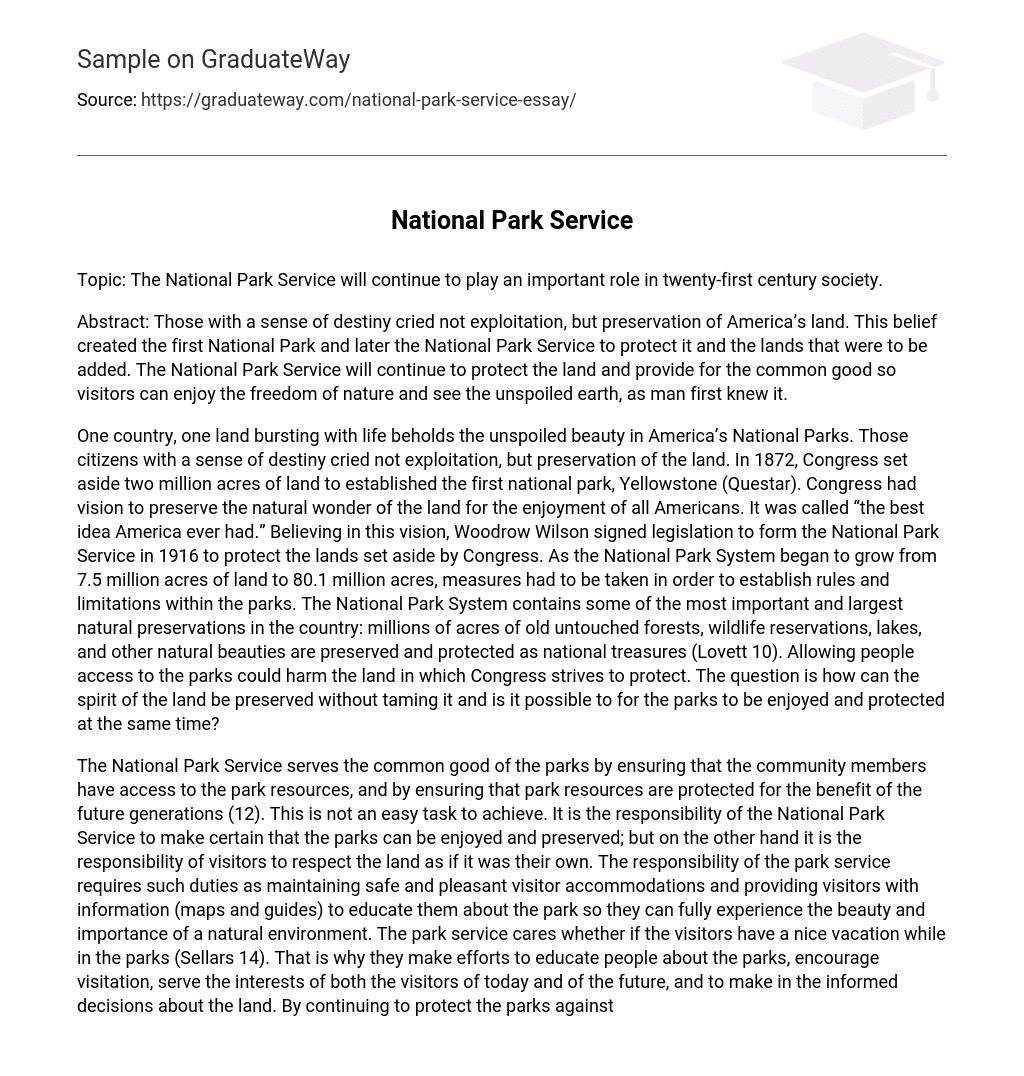Those with a sense of destiny cried not exploitation, but preservation of America’s land. This belief created the first National Park and later the National Park Service to protect it and the lands that were to be added. The National Park Service will continue to protect the land and provide for the common good so visitors can enjoy the freedom of nature and see the unspoiled earth, as man first knew it.
One country, one land bursting with life beholds the unspoiled beauty in America’s National Parks. Those citizens with a sense of destiny cried not exploitation, but preservation of the land. In 1872, Congress set aside two million acres of land to established the first national park, Yellowstone (Questar). Congress had vision to preserve the natural wonder of the land for the enjoyment of all Americans. It was called “the best idea America ever had.” Believing in this vision, Woodrow Wilson signed legislation to form the National Park Service in 1916 to protect the lands set aside by Congress.
As the National Park System began to grow from 7.5 million acres of land to 80.1 million acres, measures had to be taken in order to establish rules and limitations within the parks. The National Park System contains some of the most important and largest natural preservations in the country: millions of acres of old untouched forests, wildlife reservations, lakes, and other natural beauties are preserved and protected as national treasures (Lovett 10). Allowing people access to the parks could harm the land in which Congress strives to protect. The question is how can the spirit of the land be preserved without taming it and is it possible to for the parks to be enjoyed and protected at the same time?
The National Park Service serves the common good of the parks by ensuring that the community members have access to the park resources, and by ensuring that park resources are protected for the benefit of the future generations (12). This is not an easy task to achieve. It is the responsibility of the National Park Service to make certain that the parks can be enjoyed and preserved; but on the other hand it is the responsibility of visitors to respect the land as if it was their own. The responsibility of the park service requires such duties as maintaining safe and pleasant visitor accommodations and providing visitors with information (maps and guides) to educate them about the park so they can fully experience the beauty and importance of a natural environment.
The park service cares whether if the visitors have a nice vacation while in the parks (Sellars 14). That is why they make efforts to educate people about the parks, encourage visitation, serve the interests of both the visitors of today and of the future, and to make in the informed decisions about the land. By continuing to protect the parks against the wear and tear of use so that the original values of each park remain intact for each visitor the National Park service will continue to play an important role in the twenty-first century.
The national park system serves the individual needs of our country and our land. These needs provide tourism and vacationing, the opportunity to interact with nature, enjoyment of cultural and historical monuments, and physical exercise (Lovett16). The contributions of the park system are valued as common goods to the country. As long as the park service continues to provide their efforts to keep the parks looking beautiful and consistent with nature, America will always have a place of refuge in common.
In cooperation with the legislation passed by government, the National Park Service will continue to play an important role in American society by protecting our mountains from being striped, trees cut, and water tainted (Cong 27). Without the aid of Congress and the Park Service, America’s beautiful land could be thrashed and misused, in which case people of the future would not be able to enjoy the majestic grandeurs of America.
The influence of the National Park Service in America has spread to other countries. Without a doubt, the actions and of the National Park Service will continue to play an important role in the twenty-first century. The protection and preservation of America’s land both inside and outside the National Parks are as important now as it was when America did not even exist, and more importantly they will continue play a crucial role in the future.
Works Cited
- America’s adventurous and majestic parks. [videorecording] / [presented by] Questar Video Imprint Portland, OR: Encounter Productions; distributed by Questar Video, Chicago, IL, 1995, 1 cassette, 85 min, col, VHS.
- National Park Service 75th Anniversary Symposium recommendations. Washington: GPO, 1992.
- Lovett, Francis N. National Parks: Rights and the Common Good. Oxford: Rowman and Littlefield Publishers, Inc., 1998.
- Sellars, Richard West. Preserving Nature in the National Parks: A History. New Haven: Yale University Press, 1997.





